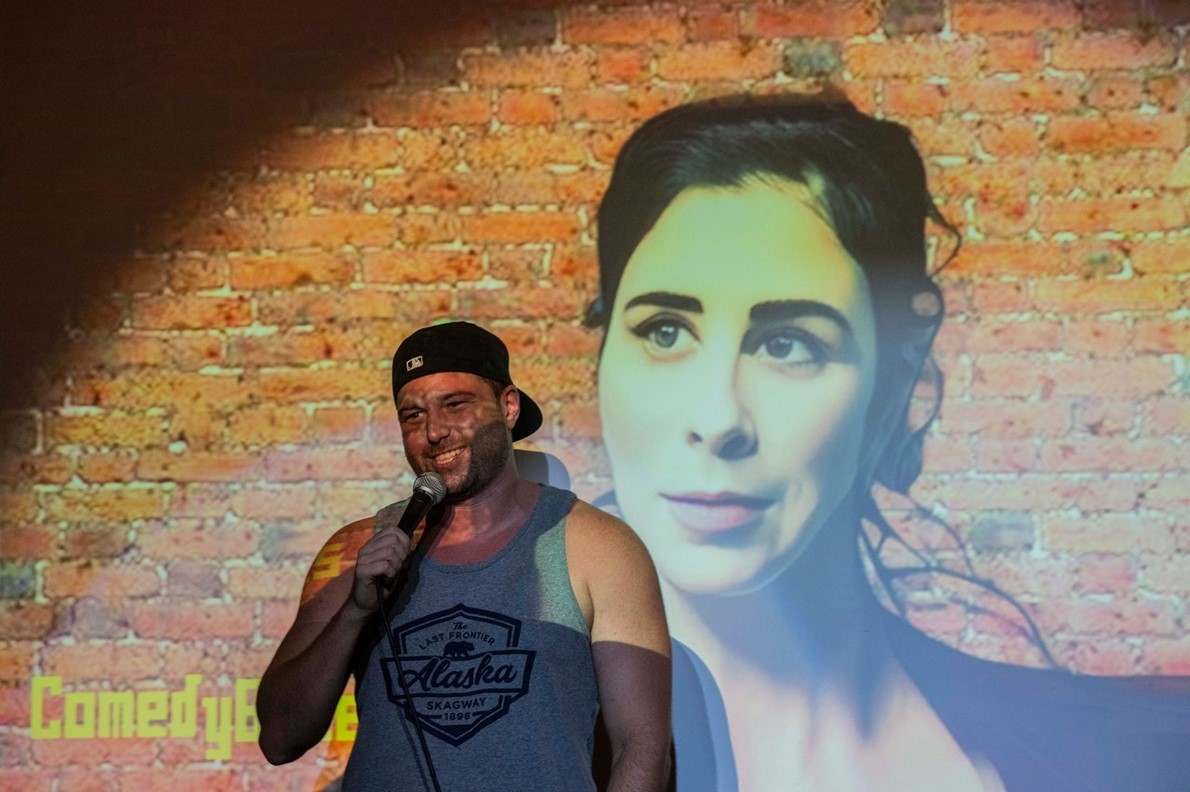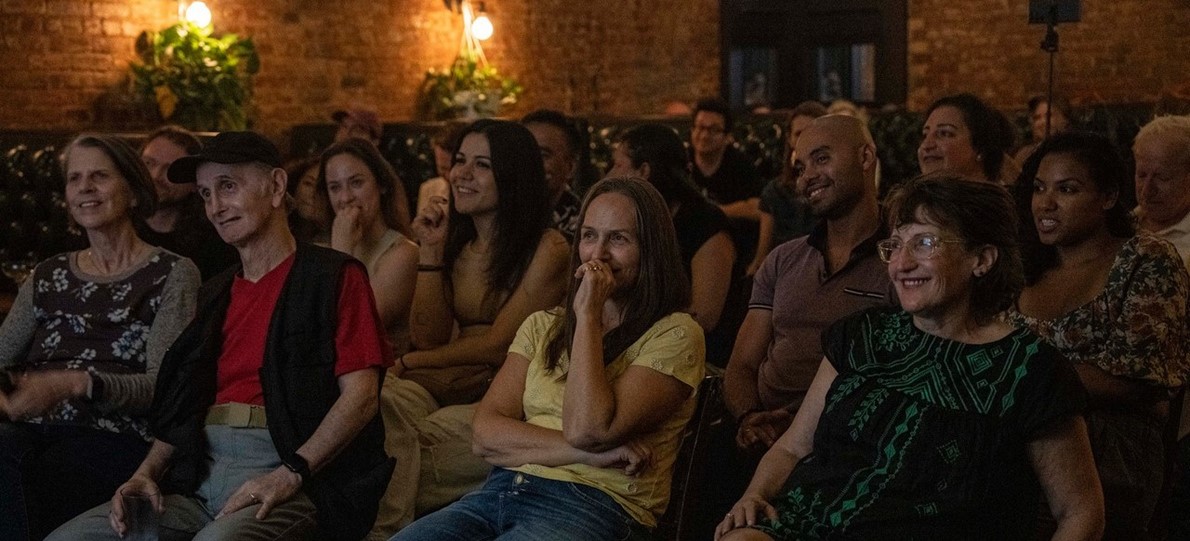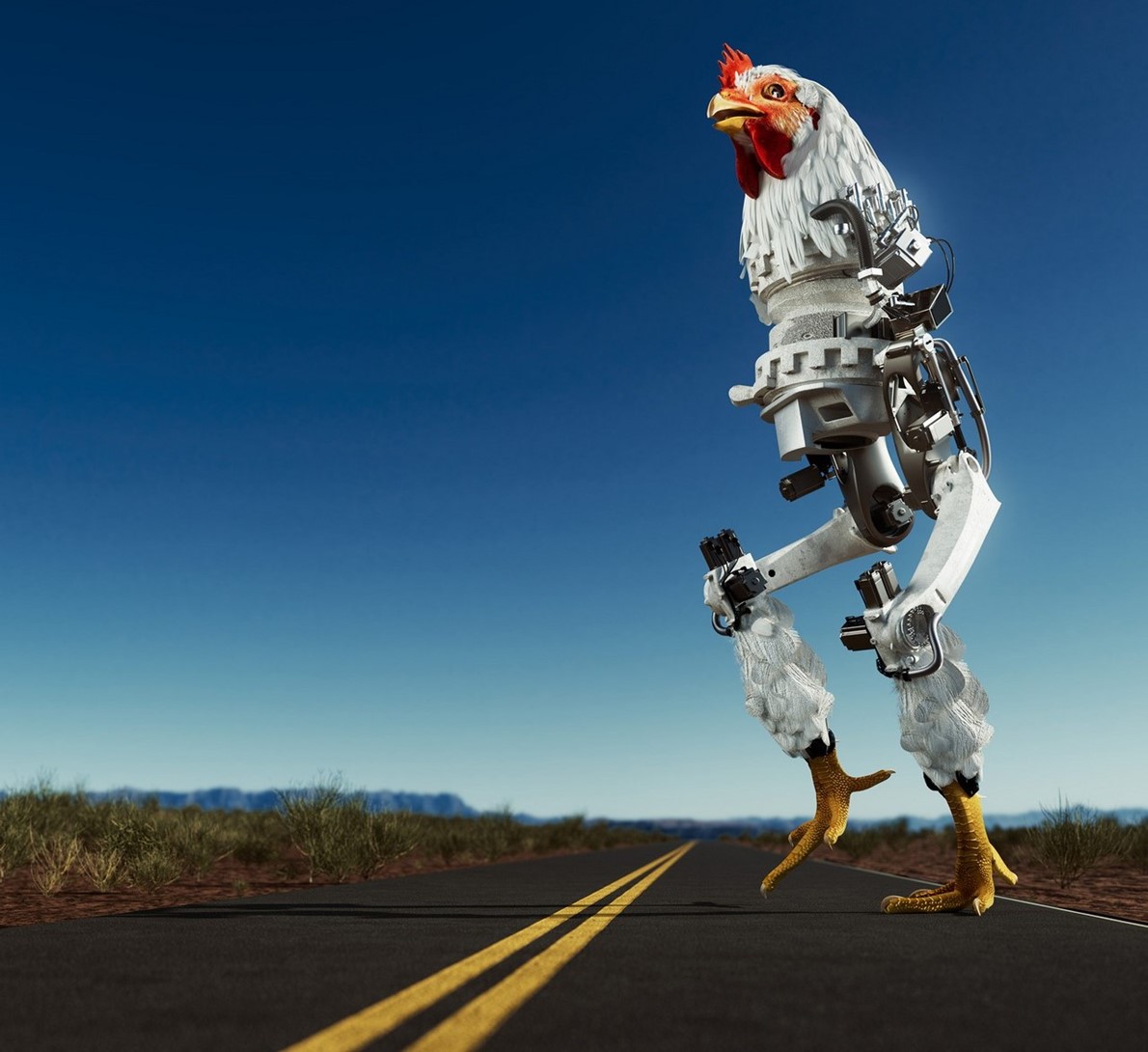Last month, in the crowded back room of a bar in the
Brooklyn borough of New York City, the fate of humanity hung in the balance.
Or at least that’s how Matt Maran, a bro-y comic from
Queens, portrayed it. He was bidding for sympathy during what was billed as the
first roast battle pitting artificial intelligence against a human comedian.
اضافة اعلان
It didn’t work. Maran lost the crowd early with a joke that
riffed on the idea that women aren’t funny. His opponent was a ChatGPT-powered
version of Sarah Silverman, the comic who, as it happens, had sued the
developer behind that chatbot for copyright infringement earlier in the week.
On a screen nearby, her head shook back and forth. “Why did the human stare at
the glass of orange juice?” it asked in a close approximation of her girlish
voice. “They were trying to concentrate.” Then oddly, it proclaimed: “Roasted!”
Neither side was getting big laughs, but the AI was more
unflappable, moving from quip to quip with the pace of a metronome. Some of its
jokes were simple similes (“You’re as edgy as a butter knife”) and at least one
didn’t make sense, but the bot drew blood with a punchline that used details
from Maran’s jokes: “You’re from Long Island and you lost your virginity to a
prostitute. Talk about starting from the bottom and staying there.” Maran
looked defeated even before the image of Silverman was replaced by one of him.
Then he got roasted by the digital version of himself. Humanity lost every
round.
 Matt Maran goes head to head with an AI version of Sarah Silverman in Brooklyn, Wednesday, July 19, 2023. In roast battles and stage shows, comics are experimenting with ChatGPT and other models. But inspired stand-ups shouldn’t fear for their jobs — yet.
Matt Maran goes head to head with an AI version of Sarah Silverman in Brooklyn, Wednesday, July 19, 2023. In roast battles and stage shows, comics are experimenting with ChatGPT and other models. But inspired stand-ups shouldn’t fear for their jobs — yet.
It’s tempting to conclude that this defeat was an
existential sign of the looming robot takeover of comedy, but the face-off felt
closer to your grandfather playing computer chess than to Garry Kasparov vs.
Deep Blue. But the event did drive home an important point about one of the
many current anxieties surrounding AI: If the human lock on humor is coming to
an end, the blame will lie with our complacency as much as technological
progress.
Until recently, comedy has been seen as so quintessentially
human that it was assumed AI would kill humanity before it would at a club. But
since the rise of large language models like ChatGPT less than a year ago, this
common wisdom no longer applies.
AI’s potential displacement of humans has become a central
issue in the labor disputes in Hollywood. Jimmy Kimmel has told jokes written
by ChatGPT on his show in February, and once-cautious computer scientists are
now predicting it will only be a matter of years before robots are regularly
generating professional comedy. Accomplished comic writer Simon Rich appeared
shook after using code-davinci-002, a bot not available to the public. When he
asked it for a parody headline for the conflict started by Russia, it
responded: “Experts Warn That War in Ukraine Could Become Even More Boring.”
Rich said he didn’t think he could beat it and “and certainly not
instantaneously, for free.”
 A roast battle between A.I. and Matt Maran in Brooklyn, Wednesday, July 19, 2023. In roast battles and stage shows, comics are experimenting with ChatGPT and other models. But inspired stand-ups shouldn’t fear for their jobs — yet.
A roast battle between A.I. and Matt Maran in Brooklyn, Wednesday, July 19, 2023. In roast battles and stage shows, comics are experimenting with ChatGPT and other models. But inspired stand-ups shouldn’t fear for their jobs — yet.
There’s no question that AI can think faster than any
comedian can and study the mechanics of a joke with more agility than ever
before. And even if irony and tone can still be challenging, its sense of humor
will only improve. It’s worth recalling that in the 1990s, supercomputers lost
to chess grandmasters before they started winning. But comedy is not chess. And
whether AI can intentionally generate truly funny art is as much a
philosophical as a technological question.
The most common case against machines is that by design,
they don’t come up with new ideas so much as collect and synthesize old ones.
And comedy, whether it’s Tim Robinson, “South Park” or Ali Wong, depends on
novelty and surprise.
Tony Veale, a computer scientist who wrote a book on comedy
and AI, “Your Wit Is My Command,” is impressed with new large-language models’
ability to imitate genre and voice, analyze and generate metaphors, explain
itself and even admit mistakes. He’s bullish on computers making
professional-level jokes in five years and when asked about originality
responded that AI’s process isn’t any different from that of young artists.
“Many comedians, such as Eddie Murphy and Jerry Seinfeld, trained themselves by
repeatedly listening to and repeating Bill Cosby’s early comedy albums,” he
wrote in an email. “We all learn from those we aim to emulate and transcend.”
He’s got a point. Plus: Much comedy doesn’t get that far
past the imitation stage. People like old jokes. Sitcoms and stand-up are often
derivative. Topical comedy often leans on formulaic phrasing and predictable
rhythms. It’s why the form most vulnerable to disruption (and displacement of
jobs) might be late-night television, featuring hosts delivering sets, which
comedians typically take months or years to develop.
On the cutting edge of this work is Joe Toplyn, who studied
engineering and edited The Harvard Lampoon before writing jokes for “Late Night
with David Letterman,” where he helped come up with the concept of throwing
watermelons off a five-story building (a very human idea). Toplyn has created a
bot called Witscript that takes a headline or thought and spits out three
jokes, then picks the best one.
Comics have always been quicker than other artists to
experiment with technology — Whitney Cummings had an eerie robot version of
herself tell jokes on a Netflix special in 2019 — and most of the half-dozen or
so I talked to who did use some form of AI to make jokes seemed underwhelmed.
Bill Oakley is a veteran of “The Simpsons” who, along with Josh Weinstein,
produced many classic episodes, including “Who Shot Mr. Burns?” He asked a bot
to write an episode in their style. The result, about a bee infestation, was
“on the level of a seventh-grade fan,” he said.
 In roast battles and stage shows, comics are experimenting with ChatGPT and other models. But inspired stand-ups shouldn’t fear for their jobs — yet.
In roast battles and stage shows, comics are experimenting with ChatGPT and other models. But inspired stand-ups shouldn’t fear for their jobs — yet.
Chris Onstad, who writes the comic Achewood, had more
success, in part because he was involved with engineers in creating a bot that
would issue an advice column in the voice of one of his characters. But he
still sees AI as more of a tool than a threat. “It’s coming for fan fiction and
pulp,” he told me during a video call, “but not high-quality literature.”
The problem is we live in an age that delights in fan
fiction and pulp and too often overlooks literature. The internet replaced some
of the power of human gatekeepers with algorithms — essentially a simpler form
of AI — that recommend content for you on Spotify or YouTube. In media and culture
today, a greater premium is placed on producing work quickly and in volume, an
approach that already benefits computers more than humans. As swagger has moved
from Hollywood to Silicon Valley, and English majors have become increasingly
scarce, our culture has lost some confidence in the ineffable, essential
qualities of human creativity.
From Plato to Hobbes to Freud, intellectuals have long
offered theories of comedy. But over the past generation or two, there’s been a
dramatic rise in the number of people treating art as a problem to be solved, a
mystery to figure out and teach. An industry of gurus and critics and educators
breaks jokes down into component parts. Upright Citizens Brigade was a hit for
a time not only because its shows built on the success of their classes, but
also because it created a system of comedy that leaned more on structure and
rules than its improv predecessors did. Revealingly, in an interview, one of
their co-founders, Ian Roberts, compared the UCB approach to “the principals of
physics.”
Every artistic field now seems to have its Robert McKee,
whose popular screenwriting classes teach genre, plot and character with
definitiveness. Toplyn was part of this wave, publishing a book on how to write
late-night jokes. He broke down monologues, desk pieces and parodies with
practical theories on how they work. And he used these conclusions to train his
bot.
There is insight to be gleaned from Toplyn, McKee and the
UCB. But at the heart of their entire enterprise is a lie, or at least a
simplification. No theory of comedy that I have read captures it all because
art can’t be boiled down to a recipe. And jokes, which include everything from
puns and pratfalls to shaggy dog stories and satirical barbs, are especially
varied and complex. As the cartoonist Saul Steinberg put it: “Trying to define
humor is one of the definitions of humor.”
In an introduction to a new book of poems produced by AI, “I
Am Code,” poet Eileen Myles is shown the work and finds it badly derivative.
There’s already a program producing formulaic poetry, Myles says, before
quipping: “It’s called the MFA.”
There are elements of math to comedy and poetry (iambic
pentameter requires an ability to count), but we must not reduce them to that.
The subconscious, the source of much creativity, cannot be mapped so neatly.
And the closer you look at great art, the more you realize that parts of it
cannot be entirely explained or predicted. This is especially true for comedy.
The funniest aspects are often those that resist logic. AI will figure out
sarcasm before silliness.
To use the most popular blockbuster of the summer, Weird
Barbie is the funniest one. That said, Stereotypical Barbie gets a different
kind of laugh, one that might help explain that rout at the roast battle. Rigid
characters trying and failing to escape their mechanistic situation is
classically funny. (Think of Charlie Chaplin trapped in the gears or Lucille
Ball at the chocolate factory.) Henri Bergson, one of the first great modern
philosophers of humor, who was wise enough to reject “imprisoning the comic
spirit in a definition,” saw comedy as a corrective to Industrial Age
automatism. He believed that we laughed as a response to people acting like
machines.
Bergson saw comedy as distinctly human. That may be in part
because he understood that it’s deeply, inescapably social. We not only laugh
more in groups, but also what we find funny depends on who is telling the joke.
A punchline about a car crash will be hilarious to one person and offensive to
another. Artificial intelligence can come up with jokes, but it can require
emotional intelligence to make them work. What makes people crack up is not
just the joke but also the connection with a human consciousness telling it.
Maybe audiences could make a similar connection with a
sophisticated computer of the future, but the Catch-22 for AI humor is the
further it gets from seeming human, the more unfunny it seems, but the closer
the imitation, the creepier it becomes as it falls deeper into the uncanny valley.
After the robot revolution, what may save human comedy from irrelevance is our
own deep-seated tribal biases. We like to laugh at our own.
Comedy by robots is more likely to succeed as a tool behind
the scenes — or in disguise. One of the more successful recent attempts at
integrating AI into comedy suggests as much.
Curious to see if AI could be funny, Jason Woliner, best
known for directing “Borat Subsequent Moviefilm,” built a crude cowboy robot
named Dale using speech-synthesis software and ChatGPT. He gave it a grizzled
character, training it to speak in monologues filled with folksy metaphors and
old-timey locutions like “I reckon.” Woliner tried him out at a party at his
house where guests could ask Dale questions.
“It was kind of captivating,” he said of the conversations.
“The AI was filtered through this character, so it didn’t have that creepiness.
It was like a parlor trick from the 1800s or something.”
This was a warm-up for a July show at a Los Angeles theater
based on the conceit that Woliner was presenting his own career retrospective.
Dale delivered a scripted introduction and then interviewed his creator,
receiving some prompts backstage from Eric Notarnicola, a collaborator on this
project. About half of what Dale said came from the AI, half was written. But
importantly, Woliner said, he didn’t tell the audience he was using AI.
“That would be a cheat,” he explained, leaving the crowd to
wonder if the voice came from a person or was prerecorded. Dale got laughs.
Some from the rambling Old West oddness of its style, but not only that. After
listening to Woliner talk about working with Jim Belushi, Dale killed when he
quipped, “Did you ever think the wrong Belushi died?”
Woliner sounded almost uneasy confessing that this
experiment made him hopeful about AI, pointing out that losing jobs is a
serious concern and merits the striking writers’ fight for a new deal. Human
creativity, he believes, is not replaceable, but it is able to integrate this
new technology in exciting, creative ways. With Dale, he found a “a new tone”
to play with and plans to continue to work with it.
The conversation about AI today gravitates toward doomsday
scenarios, but consider the utopian outcome, that bots don’t replace comics but
become useful tools. That feels modestly realistic. The ideal, it seems to me,
is that artificial intelligence gives comedians incentive to abandon the more
generic forms of their work, the predictable and hack, and inspires them to be
more eccentric, personal and original. Competition from increasingly clever
computer programs will force artists to not only rely more on intuition than
imitation, but also to think harder about what makes them, and their work,
distinctly human.
Our advantage in the comedic battle with machines is that
human flaws are always funnier than any kind of perfection. What if AI pushed
comedy to become more ambitious? A critic can dream.
Read more Entertainment
Jordan News



